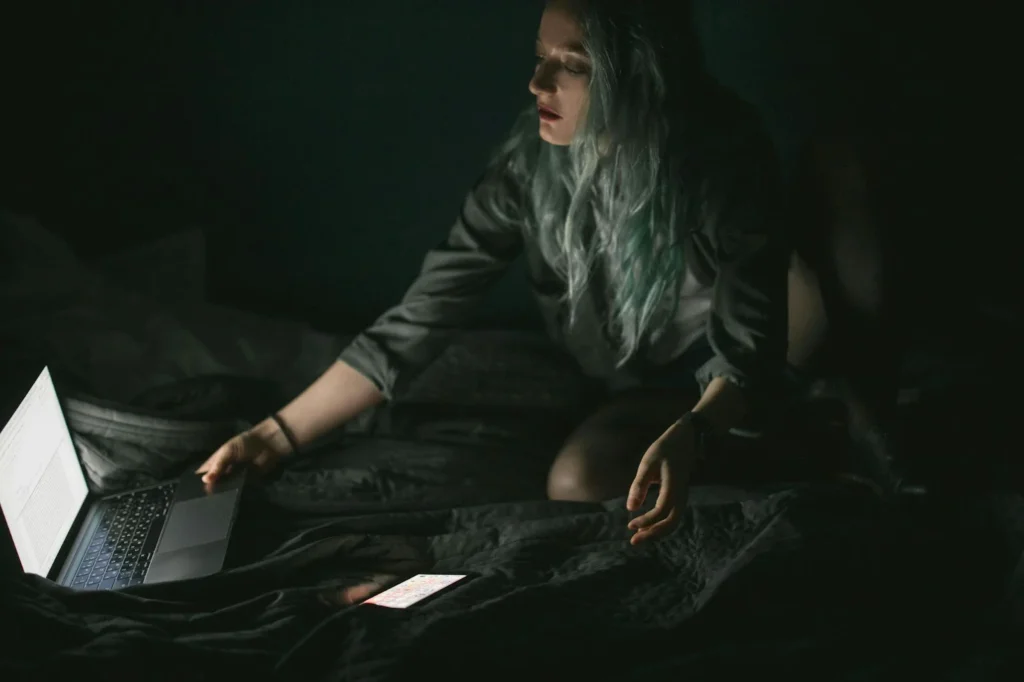In today’s digital world, we’re surrounded by screens—whether it’s our smartphones, laptops, TVs, or tablets. While these devices have brought immense convenience and connectivity, they’ve also introduced a new challenge to our health: exposure to blue light. You may have heard about the effects of blue light on our vision, but one of the most concerning impacts is on our sleep. Blue light exposure, especially at night, can significantly disrupt our body’s natural sleep-wake cycle, leading to sleep issues and affecting overall well-being. Here’s a closer look at how blue light affects sleep and what steps you can take to minimize its impact.
What Is Blue Light?
To understand why blue light is so impactful, it’s essential to know a little about light itself. Visible light is made up of a spectrum of colors, each with a different wavelength. Blue light is a high-energy visible (HEV) light with a shorter wavelength and higher energy compared to other types of light.
Natural sources of blue light include the sun, which is why exposure to sunlight during the day helps regulate our internal clock and keeps us alert and active. However, with the widespread use of digital devices, artificial sources of blue light have become prevalent and are now affecting our circadian rhythm, or sleep-wake cycle, in profound ways.
How Blue Light Affects Sleep
Our bodies operate on a circadian rhythm, a 24-hour internal clock that regulates our sleep-wake cycle, largely influenced by natural light. Exposure to blue light in the evening hours can delay the release of melatonin, the hormone that signals it’s time to wind down and sleep. This is because blue light tricks our brain into thinking it’s still daytime, causing our bodies to stay alert for longer. As a result, we may find it harder to fall asleep and experience lower-quality sleep.
Over time, prolonged exposure to blue light, especially from screens, can lead to chronic sleep problems. Studies have shown that people who use their devices at night may take longer to fall asleep, wake up more frequently during the night, and feel less rested in the morning. This impact isn’t just a minor inconvenience; poor sleep can lead to a range of health issues, including weakened immunity, impaired cognitive function, and a higher risk of mental health issues.
Signs That Blue Light May Be Disrupting Your Sleep
It can be challenging to pinpoint blue light exposure as the main culprit behind sleep issues, but there are a few signs to watch for:
- Difficulty Falling Asleep – If you’re finding it hard to fall asleep after using your phone or computer at night, blue light might be delaying your body’s natural transition to sleep.
- Frequent Waking During the Night – Exposure to blue light can affect the depth of your sleep, leading to more frequent waking or lighter, less restful sleep.
- Feeling Tired Despite a Full Night’s Sleep – Even if you’re getting a full eight hours, poor sleep quality due to blue light can leave you feeling groggy or unrefreshed in the morning.
If any of these sound familiar, there’s a good chance that reducing your blue light exposure could improve your sleep quality.
Simple Steps to Reduce Blue Light Exposure
The good news is that there are many effective strategies to manage blue light exposure and improve your sleep. Here’s how:
Use Blue Light Filters on Devices
Many smartphones, tablets, and computers now come with built-in blue light filters, often called “Night Mode” or “Blue Light Filter.” These settings reduce the amount of blue light emitted from your screen, usually by warming up the color temperature. Activating these filters, especially in the evening, can help reduce the amount of blue light exposure without affecting your ability to use your devices.
Wear Blue Light Blocking Glasses
Blue light blocking glasses have become popular among those who spend a lot of time in front of screens, especially at night. These glasses contain lenses specifically designed to filter out blue light, helping to protect your eyes and reduce the impact of blue light on your sleep. For instance, you can find blue light glasses to help reduce the strain on your eyes, potentially making it easier to wind down in the evening. These glasses work by blocking or absorbing blue wavelengths from screens, which can reduce eye strain and prevent fatigue from prolonged screen exposure
Limit Screen Time Before Bed
One of the simplest yet most effective strategies is to limit screen time before bed. Try to create a “digital curfew” by turning off all devices at least one hour before you plan to sleep. Instead of watching TV or scrolling through your phone, consider winding down with a relaxing activity like reading a book, meditating, or journaling. This not only reduces blue light exposure but also helps your brain transition into a more restful state.
Invest in Low-Blue Light Bulbs
If you’re using bright, cool-toned lights in your bedroom, consider switching to low-blue light or warm-colored bulbs. LED bulbs that emit lower blue light levels can create a sleep-friendly atmosphere, helping you feel more relaxed as you prepare for bed.
Get More Natural Light During the Day
Natural sunlight exposure during the day is essential for regulating your circadian rhythm, helping your body recognize the difference between day and night. Try to spend some time outdoors each day, especially in the morning. This exposure to natural light can help balance your sleep-wake cycle, making it easier to fall asleep at night.
How Reducing Blue Light Can Improve Your Life
Minimizing blue light exposure isn’t just about getting better sleep; it’s also about improving overall well-being. A consistent, good night’s sleep supports your immune system, boosts your mood, and enhances cognitive function. With fewer screen-induced sleep disruptions, you’re likely to feel more focused and productive during the day.
In the long term, better sleep can also lower your risk for chronic conditions like heart disease, obesity, and diabetes. By taking simple steps to reduce blue light exposure, you’re investing in a healthier lifestyle, both physically and mentally.
Blue light has become an inescapable part of modern life, but its effects on sleep can’t be ignored. While eliminating blue light entirely isn’t practical, there are several manageable steps you can take to reduce your exposure and improve your sleep quality. From using blue light filters and blocking glasses to establishing a digital curfew and optimizing your environment, these changes can make a noticeable difference. Whether it’s for better productivity, improved mood, or long-term health benefits, reducing blue light exposure can be a straightforward yet impactful way to support your body’s natural rhythms.







